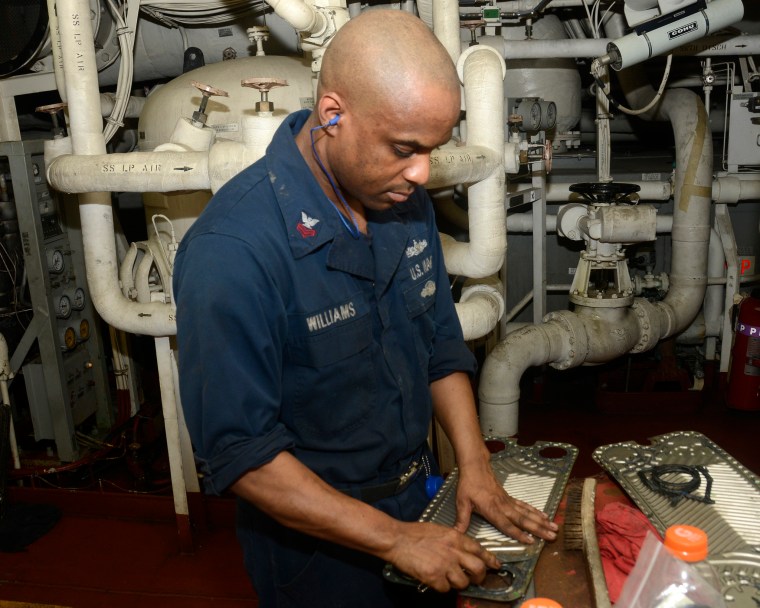It should go without saying, but proper operation of anything that has moving parts will depend on how well it’s maintained. Compressed air systems are certainly no exception; in fact; they’re a critical example of the importance of proper maintenance, for two big reasons:
*Cost: compressed air, “the fourth utility,” is expensive to generate. And it’s more expensive if it’s generated by a system that’s not operating as efficiently as it could.
*Reliability: Many industrial processes rely on clean or clean & dry air, at the right pressure, being readily available:
- When a CNC machine trips offline in the middle of making a part because it loses air pressure, it has to be reset. That means time that tight schedules may not afford, and maybe a wasted part.
- The speed of pneumatic cylinders and tools are proportional to supply pressure. Lower pressure means processes take longer. Loss of pressure means they stop.
- Dirt & debris in the supply lines will clog tight passages in air operated products. It’ll foul and scratch cylinder bores. And if you’re blowing off products to clean them, anything in your air flow is going to get on your products too.

Good news is, the preventive maintenance necessary to ensure optimal performance isn’t all that hard to perform. If you drive a car, you’re already familiar with most of the basics:
*Filtration: air compressors don’t “make” compressed air, they compress air that already exists…this is called the atmosphere, and, technically, your air compressor is drawing from the very bottom of the “ocean” of air that blankets the planet. Scientifically speaking, it’s filthy down here. That’s why your compressor has an inlet/intake filter, and this is your first line of defense. If it’s dirty, your compressor is running harder, and costs you more to operate it. If it’s damaged, you’re not only letting dirt into your system; you’re letting it foul & damage your compressor. Just like a car’s intake air filter (which I replace every other time I change the oil,) you need to clean or replace your compressor’s intake air filter on a regular basis as well.
*Moisture removal: another common “impurity” here on the floor of the atmospheric “ocean” is water vapor, or humidity. This causes rust in iron pipe supply lines (which is why we preach the importance of point-of-use filtration) and will also impact the operation of your compressed air tools & products.
- Most industrial compressed air systems have a dryer to address this…refrigerated and desiccant are the two most popular types. Refrigerant systems have coils & filters that need to be kept clean, and leaks are bad news not only for the dryer’s operation, but for the environment. Desiccant systems almost always have some sort of regeneration cycle, but it’ll have to be replaced sooner or later. Follow the manufacturer’s recommendations on these.
- Drain traps in your system collect trace amounts of moisture that even the best dryer systems miss. These are typically float-operated, and work just fine until one sticks open (which…good news…you can usually hear quite well) or sticks closed (which…bad news…won’t make a sound.) Check these regularly and, in conjunction with your dryers, will keep your air supply dry.
*Lubrication: the number one cause of rotating equipment failure is loss of lubrication. Don’t let this happen to you:
- A lot of today’s electric motors have sealed bearings. If yours has grease fittings, though, use them per the manufacturer’s directions. Either way, the first symptom of impending bearing failure is heat. This is a GREAT way to use an infrared heat gun. You’re still going to have to fix it, but if you know it’s coming, you at least get to say when.
- Oil-free compressors have been around for years, and are very popular in industries where oil contamination is an unacceptable risk (paint makers, I’m looking at you.) In oiled compressors, though, the oil not only lubricates the moving parts; it also serves as a seal, and heat removal medium for the compression cycle. Change the oil as directed, with the exact type of oil the manufacturer calls out. This is not only key to proper operation, but the validity of your warranty as well.
*Cooling: the larger the system, the more likely there’s a cooler installed. For systems with water-cooled heat exchangers, the water quality…and chemistry…is critical. pH and TDS (Total Dissolved Solids) should be checked regularly to determine if chemical additives, or flushing, are necessary.
*Belts & couplings: these transmit the power of the motor to the compressor, and you will not have compressed air without them, period. Check their alignment, condition, and tension (belts only) as specified by the manufacturer. Keeping spares on hand isn’t a bad idea either.
Optimal performance of your compressed air products literally starts with your compressor system. Proper preventive maintenance is key to maximizing it. Sooner or later, you’re going to have to shut down any system to replace a moving (or wear) part. With a sound preventive maintenance plan in place, you have a good chance of getting to say when.
If you’d like to talk about other ways to optimize the performance of your compressed air system, give me a call.
Russ Bowman
Application Engineer
Find us on the Web
Follow me on Twitter
Like us on Facebook
Image courtesy of U.S. Naval Forces Central Command/U.S. Fifth Fleet, Creative Commons License